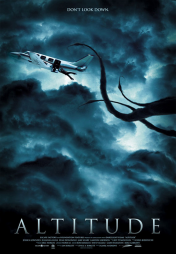
by XdarksparkX
Originally written: April 17th, 2011
[Images courtesy of Dread Central]
God damn it Jessica Lowndes, we have got to stop meeting like this! Here we are again—you’re starring in a suspect indie-horror film, and I’m stupidly intrigued to see it simply because you’re in it. This will never last if we keep this up…
Thankfully, this movie not only prominently displays the reasoning for why I’m so enamored with Jessica, but it is also leagues better than Autopsy (a praise that seems feeble after my drubbing of it, but still accurate and valid). In fact, I could go as far as saying that I enjoyed the majority of Altitude for what it was. However, the bookends of the film grind my gears to no end, especially the ending, which is so putridity Hollywood I had to forcibly restrain myself from vomiting all over my keyboard when the end-credits hit.
Before we get there, there are some good points I can actually bring up about the film. The first of course being Jessica’s performance. Once again, my girl came to play. While I have seen better from her, this was no where near the train wreck performance she put out in Autopsy—this is definitely on the upper echelon of her career’s performance hierarchy. I think director Kaare Andrews’ ability to recognize her potential and talent helped that, so kudos to him. Apparently Jessica also went out of her way to do extensive research to make sure that her aviation jargon and such was believable, even going as far as taking flying lessons. I’m no aviation expert, but she damn sure sold me on it.
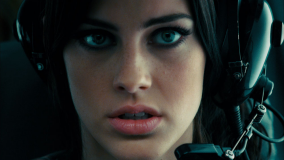
See girls? You can still be pretty and not suck at your craft!
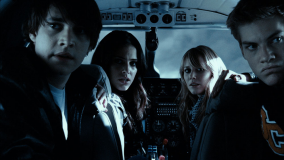
Impressive... most impressive.
Thankfully, this movie not only prominently displays the reasoning for why I’m so enamored with Jessica, but it is also leagues better than Autopsy (a praise that seems feeble after my drubbing of it, but still accurate and valid). In fact, I could go as far as saying that I enjoyed the majority of Altitude for what it was. However, the bookends of the film grind my gears to no end, especially the ending, which is so putridity Hollywood I had to forcibly restrain myself from vomiting all over my keyboard when the end-credits hit.
Before we get there, there are some good points I can actually bring up about the film. The first of course being Jessica’s performance. Once again, my girl came to play. While I have seen better from her, this was no where near the train wreck performance she put out in Autopsy—this is definitely on the upper echelon of her career’s performance hierarchy. I think director Kaare Andrews’ ability to recognize her potential and talent helped that, so kudos to him. Apparently Jessica also went out of her way to do extensive research to make sure that her aviation jargon and such was believable, even going as far as taking flying lessons. I’m no aviation expert, but she damn sure sold me on it.

See girls? You can still be pretty and not suck at your craft!
As a matter of fact, now that I think about it, everyone in this film was solid as far as performances go for a movie of this quality, and that’s huge when the script calls for your main cast to be isolated with each other in a small confined space for a majority of the runtime. I mean, could you imagine what The Breakfast Club would’ve been like as a character piece had the actors just sucked complete ass? I shudder at the thought.

Impressive... most impressive.
The only person who’s performance I had a problem with was Landon Liboiron, or as I call him when knocking the crap-fest that Degrassi: The Next Generation has become, “Eyebrows”. I don’t know, I just never feel like he is actually emoting at any point in the entire film. I get that his character is supposed to be emotionally distant, but I mean when everyone else around you is actually turning in semi-decent performances and you’ve got an air of “I don’t give a shit” / “uhhh what?” about you, it stands out like an NBA player at a jockey convention.
I also must say that the visual effects are phenomenally well done throughout 99% of the film (there’s one really obvious scene at the end that looks bleh), and when you consider the paltry budget they had to work with, its a pretty astounding feat to accomplish. Most of the visual effects shots are so well done, you wouldn’t even think they were VFX shots, and that’s more than some mega-budget films can say...
Now comes the bad. First off, the way the movie kicks off is a great framing point with a mid-air plane collision, but in that short 5 minutes it becomes painfully obvious that the child on the plane will play an extremely significant role, and the second Landon shuffles into frame it hits you like a Captain Obvious freight train.
Also of note in the character-establishing scene, Julianna Guill’s character Mel randomly states that she’s a film student in the opening. Yet not two minutes before that we saw the first shot of her using her the camera, and we can clearly see that the damn thing isn’t on—there’s no picture in the LCD viewfinder. Not to mention, every so often during the first half-hour or so they cut to her camera’s perspective, yet the digital quality they show the camera to capture is so atrociously bad it’s almost laughable. It honestly looks like it was recorded on a cell phone from five years ago, not an actual DV camera as portrayed. Film major my ass! No self-respecting film student would bother owning such a blatant piece of trash, no matter how cheap they got it. This information never comes back in any substantial way either, so it’s basically a piece of pointless character exposition.
Once the plane gets off the ground, the film actually becomes a pretty damn decent thriller film. It all looks like smooth sailing, until they are swallowed by a supernatural storm cloud and Jess isn’t instrument rated, which means she has to visually maintain separation from the ground at all times. A loose screw channels the Final Destination series and conveniently lodges itself into the elevator controller, making it impossible for Jess to taper off after she realizes that she can’t pull up over the storm, and shit has officially hit the fan. Is it perfect? Not on your life, but it’s damn sure entertaining, and the dialog is pretty damn solid as well. Jessica frequently calls Jake Weary’s macho-jock character Sal out on just about every stupid idea he comes up with when he’s in his three sheets to the wind haze (seriously, drinking is one thing, but this dude is a chronic alcoholic—he continually washes beer down with more beer for the first 40 minutes of the film).
The scene that really had me applauding Paul A. Birkett’s writing was when Sal starts flipping out and saying they should draw straws to see who gets the lone parachute on board. Jess proceeds to go into a highly logical rant about not knowing who packed the chute, if it’s packed properly, or how high they actually are. “You think we’re 10,000 feet up, but if we’re only a thousand, you’ll hit the ground before you can even deploy the chute!” My god, was that just a smart, logical argumentative point in a low-grade thriller / horror film? Did the devil by any chance happen to ice skate to work today?
This is not to say the writing is without its faults though. The aforementioned useless character exposition that takes place in the beginning aside, most of Sal’s asshole-ery comes out of far left field from Parking Lot J with little to no actual provocation. This would work, if he actually gave off the vibe of a true asshole the rest of the time instead of just a cocky jerk. It’s almost like at intermittent points during the writing process Birkett said to himself “I need to remind the audience that Sal’s a dick.” Yeah, we got that. You don’t need these stupid, random things that can only really be backed up by the terribly flimsily argument that he’s tipsy to happen for us to get that.
Then comes the ending… dear god, what in the hell of all that is went wrong here!? My frustration with it was actually compounded by the fact that I watched the behind-the-scenes documentary on the DVD after the film, and found out that the original script ending was leagues better conceptually. After Jessie kisses Eyebrows and he says “you didn’t mean it, did you?” The clouds would’ve parted and they would’ve slammed right into a mountain, abruptly ending the film. I would’ve taken that and ran with it, when put into comparison with what ultimately ended up on film!
The major problem is that for the first 75-80 minutes of the movie, they have set their ground rules as far as feasible possibilities go. Yes, you can introduce something new in the guise of a major twist, but you can really only do it once. After that, you start pulling serious Hand of God / Deus Ex Machina bullshit out, and the audience you’ve manage to captivate is so violently thrown by the turn of events that they get ripped out of the film.
So they find out that Eyebrows is the one causing Cthulhu to come after them (the creature doesn’t have a name, so I will refer to it as that from here on out), simply through his imagination and fears. Okay, so there is your twist, it’s become a psychological thriller type of deal. Right, you’ve used up your big twist—Cthulhu’s existence is purely the power of imagination, and can be stopped if Eyebrows would just stop being such a “goddamn pussy” (Jessie’s words in the film, not mine!) and just think of happier times. Of course, he can’t… because the dumb shit was probably under the covers reading the Necronomicon before going to bed every night when he was eight years old.
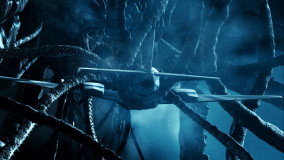
“That is not dead which can eternal lie...”
I also must say that the visual effects are phenomenally well done throughout 99% of the film (there’s one really obvious scene at the end that looks bleh), and when you consider the paltry budget they had to work with, its a pretty astounding feat to accomplish. Most of the visual effects shots are so well done, you wouldn’t even think they were VFX shots, and that’s more than some mega-budget films can say...
Now comes the bad. First off, the way the movie kicks off is a great framing point with a mid-air plane collision, but in that short 5 minutes it becomes painfully obvious that the child on the plane will play an extremely significant role, and the second Landon shuffles into frame it hits you like a Captain Obvious freight train.
Also of note in the character-establishing scene, Julianna Guill’s character Mel randomly states that she’s a film student in the opening. Yet not two minutes before that we saw the first shot of her using her the camera, and we can clearly see that the damn thing isn’t on—there’s no picture in the LCD viewfinder. Not to mention, every so often during the first half-hour or so they cut to her camera’s perspective, yet the digital quality they show the camera to capture is so atrociously bad it’s almost laughable. It honestly looks like it was recorded on a cell phone from five years ago, not an actual DV camera as portrayed. Film major my ass! No self-respecting film student would bother owning such a blatant piece of trash, no matter how cheap they got it. This information never comes back in any substantial way either, so it’s basically a piece of pointless character exposition.
Once the plane gets off the ground, the film actually becomes a pretty damn decent thriller film. It all looks like smooth sailing, until they are swallowed by a supernatural storm cloud and Jess isn’t instrument rated, which means she has to visually maintain separation from the ground at all times. A loose screw channels the Final Destination series and conveniently lodges itself into the elevator controller, making it impossible for Jess to taper off after she realizes that she can’t pull up over the storm, and shit has officially hit the fan. Is it perfect? Not on your life, but it’s damn sure entertaining, and the dialog is pretty damn solid as well. Jessica frequently calls Jake Weary’s macho-jock character Sal out on just about every stupid idea he comes up with when he’s in his three sheets to the wind haze (seriously, drinking is one thing, but this dude is a chronic alcoholic—he continually washes beer down with more beer for the first 40 minutes of the film).
The scene that really had me applauding Paul A. Birkett’s writing was when Sal starts flipping out and saying they should draw straws to see who gets the lone parachute on board. Jess proceeds to go into a highly logical rant about not knowing who packed the chute, if it’s packed properly, or how high they actually are. “You think we’re 10,000 feet up, but if we’re only a thousand, you’ll hit the ground before you can even deploy the chute!” My god, was that just a smart, logical argumentative point in a low-grade thriller / horror film? Did the devil by any chance happen to ice skate to work today?
This is not to say the writing is without its faults though. The aforementioned useless character exposition that takes place in the beginning aside, most of Sal’s asshole-ery comes out of far left field from Parking Lot J with little to no actual provocation. This would work, if he actually gave off the vibe of a true asshole the rest of the time instead of just a cocky jerk. It’s almost like at intermittent points during the writing process Birkett said to himself “I need to remind the audience that Sal’s a dick.” Yeah, we got that. You don’t need these stupid, random things that can only really be backed up by the terribly flimsily argument that he’s tipsy to happen for us to get that.
Then comes the ending… dear god, what in the hell of all that is went wrong here!? My frustration with it was actually compounded by the fact that I watched the behind-the-scenes documentary on the DVD after the film, and found out that the original script ending was leagues better conceptually. After Jessie kisses Eyebrows and he says “you didn’t mean it, did you?” The clouds would’ve parted and they would’ve slammed right into a mountain, abruptly ending the film. I would’ve taken that and ran with it, when put into comparison with what ultimately ended up on film!
The major problem is that for the first 75-80 minutes of the movie, they have set their ground rules as far as feasible possibilities go. Yes, you can introduce something new in the guise of a major twist, but you can really only do it once. After that, you start pulling serious Hand of God / Deus Ex Machina bullshit out, and the audience you’ve manage to captivate is so violently thrown by the turn of events that they get ripped out of the film.
So they find out that Eyebrows is the one causing Cthulhu to come after them (the creature doesn’t have a name, so I will refer to it as that from here on out), simply through his imagination and fears. Okay, so there is your twist, it’s become a psychological thriller type of deal. Right, you’ve used up your big twist—Cthulhu’s existence is purely the power of imagination, and can be stopped if Eyebrows would just stop being such a “goddamn pussy” (Jessie’s words in the film, not mine!) and just think of happier times. Of course, he can’t… because the dumb shit was probably under the covers reading the Necronomicon before going to bed every night when he was eight years old.

“That is not dead which can eternal lie...”
So, this should be it—your story’s resolution should to come within the context of this twist. Nope, not the case with Altitude. Instead they attempt to add another twist, using—of all things—time travel.
No. No, no, no, no… NO! Damn it, Andrews! You have officially thrown the carcass to the wolves; you have disengaged your audience with this overcomplicated nonsense. Why in the Lovecraftien hell would you do this!?
Now, surely some people are going to say, “well, you can buy the fact that Eyebrows can manifest Cthulhu’s disembodied head from the depth of the sunken city of R’lyeh, but you can’t buy that he can take them back in time?” To answer that: yes, I cannot buy that for a second. Aside from the fact that their earth-shattering twist was already well done with the teasers and eventual appearance of Cthulhu, at the same time it’s fantastical within the depths of imagination—like a schizophrenic’s psychotic episode, who are we to tell them what they are seeing isn’t real? I actually thought that would’ve been a great commentary as a whole for this film; but alas, by throwing the time-travel twist into the finale purely to achieve that ham-fisted bullshit Hollywood ending, they’ve created a climax that I simply can’t support. That is because it feels like the biggest crutch job in the world. Kaare tries to justify this in the BTS doc by saying that “by [the characters] allowing themselves to die in the present, they’ve saved a better version of themselves in the past, where their families are not killed and there’s no emotional baggage that keeps them from being together.” That’s all well and good, except for the fact that it makes no logistical sense!
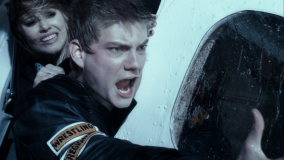
“OH, COME ON!!!”
No. No, no, no, no… NO! Damn it, Andrews! You have officially thrown the carcass to the wolves; you have disengaged your audience with this overcomplicated nonsense. Why in the Lovecraftien hell would you do this!?
Now, surely some people are going to say, “well, you can buy the fact that Eyebrows can manifest Cthulhu’s disembodied head from the depth of the sunken city of R’lyeh, but you can’t buy that he can take them back in time?” To answer that: yes, I cannot buy that for a second. Aside from the fact that their earth-shattering twist was already well done with the teasers and eventual appearance of Cthulhu, at the same time it’s fantastical within the depths of imagination—like a schizophrenic’s psychotic episode, who are we to tell them what they are seeing isn’t real? I actually thought that would’ve been a great commentary as a whole for this film; but alas, by throwing the time-travel twist into the finale purely to achieve that ham-fisted bullshit Hollywood ending, they’ve created a climax that I simply can’t support. That is because it feels like the biggest crutch job in the world. Kaare tries to justify this in the BTS doc by saying that “by [the characters] allowing themselves to die in the present, they’ve saved a better version of themselves in the past, where their families are not killed and there’s no emotional baggage that keeps them from being together.” That’s all well and good, except for the fact that it makes no logistical sense!

“OH, COME ON!!!”
When you deal with time-travel Kaare, you need to be VERY careful if you want to make it legitimate. My rant on the Cameron’s Terminator films illustrates that—you have to think in terms of linear time progression in order for your time-travel plot point to work. What you’re saying Kaare is that they somehow saved themselves from the fate of the movie by going back to the day the crash happened, SOMEHOW REPLACING THE PLANE THAT CLIPPED THE ORIGINAL WITH THEIR OWN, and making a ‘better life’ for themselves? I hate to break it to you, but the other plane would still be there! They didn’t make Jessica’s mom (who was in fact the pilot of the plane little Eyebrows and parents were on at the beginning of the film) alter course—in fact, they didn’t make the original plane do anything except say “holy shit, where did he come from?” GAH! What is it with people trying to make time a loop; it is a continuous linear progression of events! Why is it that the only film that managed to get this right is Back To The Future? Look, there is an initial progression of events. If you jump back to one of those events, your presence can alter said events and potentially erase coming ones from that point on, but those initial events will still unfold exactly as they did when you weren’t there until you intervene!
Here’s the best way I can put it—I’ll partially regurgitate what I said in my Terminator rant. Think of time in the sense of a piece of string. Now, as pivotal / memorable events happen, you tie a knot at a certain point in that string. So eventually you’d have this piece of string with knots at various points. Now suppose you added a time-travel variant to this idea, and decided that at the tenth knot you wanted to go back to the fifth. Whether or not you alter it from then on, the fifth knot will still exist as it did when it was originally formed when you go back to it. It only changes when you mess with it after revisiting it.
Now, imagine that you took the current end of your string, and you looped it back to that fifth knot. Congratulations, you have just created a paradox! Because think about it, if now the plane that was supposed to hit them at the beginning was really Jessie and Eyebrows from the future, how can they get to the point where they get caught in the storm if they now live “happily ever after?” Exactly, they wouldn’t—at some point they would have to have the events of the movie happen because it’s the only way to get to that false hope of happiness. You haven’t rewritten a happier life for yourself; you’ve actually DOOMED yourself to constantly end your life at 21 on that plane so you can have a ‘better childhood’. Because technically, you will now be forced to exist in an infinite circle, because the only way the past can happen is if you go back to the end of the circle you’ve created. And where does a circle end? Wherever it begins—it always comes back around.
Here’s the best way I can put it—I’ll partially regurgitate what I said in my Terminator rant. Think of time in the sense of a piece of string. Now, as pivotal / memorable events happen, you tie a knot at a certain point in that string. So eventually you’d have this piece of string with knots at various points. Now suppose you added a time-travel variant to this idea, and decided that at the tenth knot you wanted to go back to the fifth. Whether or not you alter it from then on, the fifth knot will still exist as it did when it was originally formed when you go back to it. It only changes when you mess with it after revisiting it.
Now, imagine that you took the current end of your string, and you looped it back to that fifth knot. Congratulations, you have just created a paradox! Because think about it, if now the plane that was supposed to hit them at the beginning was really Jessie and Eyebrows from the future, how can they get to the point where they get caught in the storm if they now live “happily ever after?” Exactly, they wouldn’t—at some point they would have to have the events of the movie happen because it’s the only way to get to that false hope of happiness. You haven’t rewritten a happier life for yourself; you’ve actually DOOMED yourself to constantly end your life at 21 on that plane so you can have a ‘better childhood’. Because technically, you will now be forced to exist in an infinite circle, because the only way the past can happen is if you go back to the end of the circle you’ve created. And where does a circle end? Wherever it begins—it always comes back around.




